|
|
|
Sort Order |
|
|
|
Items / Page
|
|
|
|
|
|
|
| Srl | Item |
| 1 |
ID:
189623


|
|
|
|
|
| Summary/Abstract |
Vinayak Damodar Savarkar (28 May, 1883 - 26 February, 1966) also famous as Swatantryaveer Savarkar was a freedom fighter and ardent Indian nationalist from Maharashtra. Savarkar was indisputably the most influential personality, who championed the cause of “Hindu” rights in 20th century and still remains the undisputed icon of the ideology of “Hindutva” in the contemporary times. Savarkar dedicated his whole life for the independence of India. Along with fighting for the independence of the country Savarkar contributed extensively in awakening of the Hindu society during his lifetime. Savarkar also wrote on varied range of topics which are still of pivotal importance for the contemporary Indian society.
|
|
|
|
|
|
|
|
|
|
|
|
|
|
|
|
| 2 |
ID:
189612
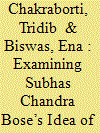

|
|
|
|
|
| Summary/Abstract |
Subhas Chandra Bose remains a leading personality who has symbolized himself as a leading freedom fighter, a true guide, and a devoted friend of the Indian masses and the world. As one of the chief architects of the Indian freedom movement, he awakened the country’s masses from the slavish siesta of self-degradation and stimulated their sense of its cultural, historical, and national glory. Throughout his political career, India’s liberation from British rule remained Subhas Chandra Bose’s foremost political goal, and his idea of nationalism is not only a political movement but an ethical one as well. This article will highlight the major rationale behind Subhas Chandra Bose’s contribution to promulgating the ideas of nationalism in the minds of the Indian masses.
|
|
|
|
|
|
|
|
|
|
|
|
|
|
|
|
| 3 |
ID:
189619
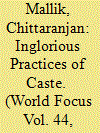

|
|
|
|
|
| Summary/Abstract |
Ambedkar wrote that caste will cease to be an operational force only when inter-dining and inter-marriage have become matters of common course. A large majority of Hindus do not inter-dine and inter-marry, because inter-dining and inter-marriage are repugnant to their beliefs and dogmas which the Hindus regard as sacred. He argued, ‘caste is a notion, it is a state of mind. The destruction of caste does not therefore mean the destruction of a physical barrier. It means a notional change.
|
|
|
|
|
|
|
|
|
|
|
|
|
|
|
|
| 4 |
ID:
189621
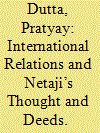

|
|
|
|
|
| Summary/Abstract |
Subhash Chandra Bose was a great humanist, synthesizer and cosmopolitan thinker . And his contribution was not limited in Indian political thought. He was not only committed to humanity and peace in Indian society, actually he was committed to promote humanity and peace in Indian society. Subhash Chandra Bose is popularly known as Netaji. It was under the influence of his parents that he developed a profoundly religious and spiritual frame of mind and love for Hindu scriptures from his early life to the last days of his glorious career in the battlefields of South East Asia in 1945. The credential of Subhash Chandra Bose as a socio-political thinker would be well traced on a careful study of his activities, letters, writings and speeches at different phases of the freedom struggle, indicating a process of evolution of his social, economic and political concepts connected with the development of his own mind responding to the shifting environment in India and the World outside.
|
|
|
|
|
|
|
|
|
|
|
|
|
|
|
|
| 5 |
ID:
189615
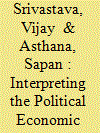

|
|
|
|
|
| Summary/Abstract |
Many of the scholars of present time have an opinion about Sardar Patel’s political and economic legacy. In last few years, in the domain of social science, much of the literature produced by scholars on Sardar Patel and his ideology. The prime reference for this paper belongs to original writings and speeches of Sardar Patel. The quotes and writings of other big political figures and scholars will be also analysed in exploratory manner.
|
|
|
|
|
|
|
|
|
|
|
|
|
|
|
|
| 6 |
ID:
189620


|
|
|
|
|
| Summary/Abstract |
India as a nation had seen so many thinkers, philosopher, revolutionaries, freedom fighters, and many more who had contributed their significant efforts in the process of unification or in the making of Akhând Bharat. Their far-sighted vision laid the foundation against the oppressor and their oppressed rule. Meanwhile, the significant issue is that they don’t just fight with the oppressor who came from outside rather they also made several contradictions with the social anomalies which restrained the unification process among the nation. Among these, there are numerous categories of leaders who came up with static principles and norms, strong conviction, and dedicated their entire life to attain the goal i.e., the making and (true) liberation of the nation. Vallabhbhai Patel, first Deputy Prime Minister of the nation, comes very firstly to this category.
|
|
|
|
|
|
|
|
|
|
|
|
|
|
|
|
| 7 |
ID:
189624


|
|
|
|
|
| Summary/Abstract |
Prime Minister of India, Narendra Modi rightly echoed the personality of Patel at the inauguration of Sardar Patel Statue,‘Sardar Patel used Kautilya’s wisdom and Shivaji Maharaj’s bravery to achieve the great feat of uniting India after partition’. Undoubtedly, Kutch to Kohima, or Kanyakumari—if we can travel freely today across the beautiful and bountiful lands of India, it is because of Sardar Vallabhbhai Patel.
|
|
|
|
|
|
|
|
|
|
|
|
|
|
|
|
| 8 |
ID:
189617


|
|
|
|
|
| Summary/Abstract |
In 1917 Patel found the course of his life changed after having been influenced by Mohandas K. Gandhi. Patel adhered to Gandhi’s satyagraha (policy of nonviolence) insofar as it furthered the Indian struggle against the British. But he did not identify himself with Gandhi’s moral convictions and ideals, and he regarded Gandhi’s emphasis on their universal application as irrelevant to India’s immediate political, economic, and social problems. Nevertheless, having resolved to follow and support Gandhi, Patel changed his style and appearance. He quit the Gujarat Club, dressed in the white cloth of the Indian peasant, and ate in the Indian manner.
|
|
|
|
|
|
|
|
|
|
|
|
|
|
|
|
| 9 |
ID:
189625


|
|
|
|
|
| Summary/Abstract |
Sardar Patel, a freedom fighter and one of the founders of a new, integrated, and united modern India. Sardar is known as the “Iron Man of India” for his role in uniting India. After Independence, his role in the independent India amplified. Sardar Vallabhai Patel was elected as the first Home Minister of India and later as the first Deputy Prime Minister of India. In 1947, India had finally gained its independence. However, it was accompanied by vexing issues such as partition, the challenge of princely state integration, and the refugee crisis. Furthermore, a crippling economy and resource constraints, widespread poverty and illiteracy, nascent institutions, and an ill-equipped colonial machinery all contributed to this situation. So, in this context, it’s not difficult to understand why India’s new government found the integration of as many as 565 princely states an arduous task. This article will focus on how Sardar Patel handled these problems with dexterity and would prove to be the “Architect of Modern India.”
|
|
|
|
|
|
|
|
|
|
|
|
|
|
|
|
| 10 |
ID:
189618
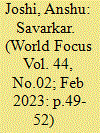

|
|
|
|
|
| Summary/Abstract |
Hindu Nationalism, as defined and promoted by Savarkar, provides a significant base here. Savarkar promoted the idea of India as a nation, and a society free of ill practices. The philosophical approach of Hindutva not only can help in promoting global collaboration and cooperation, it can also help in global peace, security and sustainability, the most prioritised global objectives presently.
|
|
|
|
|
|
|
|
|
|
|
|
|
|
|
|
| 11 |
ID:
189613


|
|
|
|
|
| Summary/Abstract |
Savarkar had his own idea of social reform with an objective of purifying Hinduism to inject unity within Hindu religion and make increasingly progressive. He thus advocated for social reform by removing untouchability and caste discrimination to make Hindu religion subsequently accommodative of people belonging to different castes. He advocated as well as worked for assimilation and annihilation of caste system considering untouchability as a curse and detrimental to Hindu unity.
|
|
|
|
|
|
|
|
|
|
|
|
|
|
|
|
| 12 |
ID:
189614


|
|
|
|
|
| Summary/Abstract |
Savarkar’s legacy can be broadly divided into two parts. The first part of his legacy is concerned with his public life as a political revolutionary, who devoted major part of his life to confront the British rule in a missionary zeal. His conviction and imprisonment for more than a decade is the testimony to his patriotism and revolutionary legacy. However, in the second part of his life, he passionately developed, articulated and advocated his ideology of Hindutva and Hindu Rashtra through the platform of Hindu Mahasabha and elsewhere. His legacy of Hindutva, Hindu Rashtra and cultural nationalism continues to evoke reactions across India’s present political spectrum.
|
|
|
|
|
|
|
|
|
|
|
|
|
|
|
|
| 13 |
ID:
189616
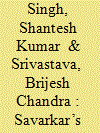

|
|
|
|
|
| Summary/Abstract |
Since his death in 1969, Vinayak Damodar Savarkar has been under studied and over simplified. Despite being a prominent socialist theorist, he has been ignored by philosophical, religious, and political fields in India. This is because he has been branded as a radical nationalist during the course of his life. His popular work “Hindutva: Who Is a Hindu?” explores the concept of Hindu Rastra and paints a specific picture of India and the Hindutva philosophy. Over the course of time, this text became the Hindu religion’s guiding document. He created the concept of Hindu Rastra, which is important to understand in this era of Hindu nationalism in Indian politics. This article makes an effort to get to the bottom of Savarkar’s philosophy of Hindutva and his book Hindutva: Who is a Hindu? in simple terms.
|
|
|
|
|
|
|
|
|
|
|
|
|
|
|
|
| 14 |
ID:
189622


|
|
|
|
|
| Summary/Abstract |
Veer Damodar Savarkar, famously known as ‘veer’ Savarkar is a popular political philosopher of India. Savarkar had significantly penned down his thoughts and ideas based on the glorious culture of India and its historical foundations. Savarkar released a number of works about Hindutva and Hindu ideologies that led to a significant influence on the people of India. It is also a fact that many of us believe that Savarkar coined the word Hindutva in order to spread and encourage the practice of Hinduism and its social and cultural formations and the factors behind this have remained highlighted in his work. Because much of Savarkar’s work has been deleted from public areas, this book is often used, and most of the time it is misquoted, to create the idea of violent Hindutva.
|
|
|
|
|
|
|
|
|
|
|
|
|
|
|
|
|
|
|
|
|